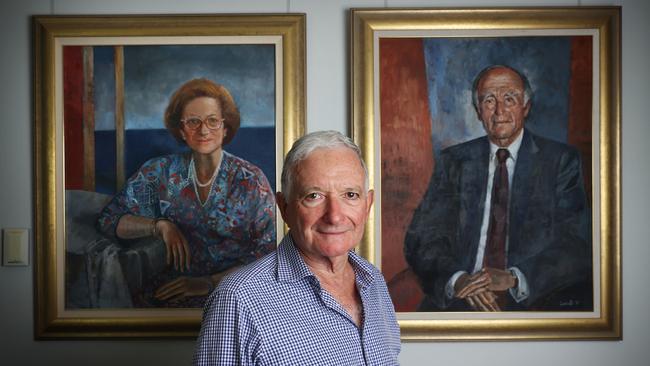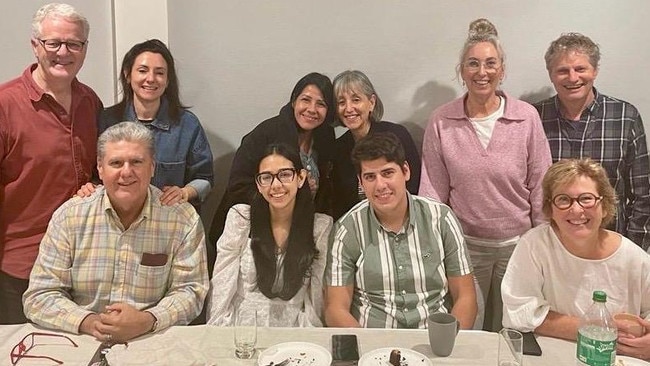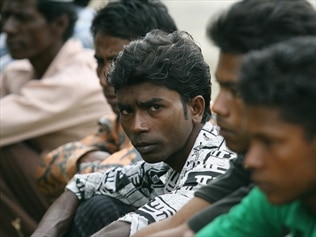Sponsorship of refugees a path to ‘facing future’, says Nick Greiner
Former NSW premier Nick Greiner is a key backer for Community Refugee Sponsorship Australia, a charity body that helps newly arrived refugees settle into their new homes.

Nick Greiner’s career was defined by his efforts to promote a multicultural Australia, but exploring a family history intertwined with the post-war exodus of Jewish refugees drew him to a new purpose.
The former NSW premier is a key backer for Community Refugee Sponsorship Australia, the charity body behind the delivery of a federal program to help newly arrived refugees settle into their new homes.
Through its philanthropic backing, CRSA provides $5000 grants to community groups that give a year of hands-on help to refugees in getting settled.
Mr Greiner was born in post-war communist Hungary and migrated to Australia at four.
It marked the promise of a better life after his mother, the daughter of Jewish converts to Catholicism, was liberated from a German work camp.
“I naturally have an interest in immigration; it seems to me a quintessentially Australian interest, given we are obviously a migrant nation,” Mr Greiner said
He said the support program was an urgently modern initiative that could forge more socially cohesive communities amid fraught anti-Semitic violence and reports of recidivism among former immigration detainees released under the NZYQ decision.
“We’ve got maybe 120 different nationalities here, and by and large until recently they haven’t imported their differences. It’s been a very successful society,” Mr Greiner said.
“Refugees can have trouble assimilating. Some of them get into trouble in terms of criminal behaviour. Clearly if you have this sort of sponsorship, it will dramatically reduce the likelihood that refugees won’t be anything but happy members of an Australian community.
“It’s very sad to see the anti-Semitic outbreak because the really remarkable thing about Australia … is that we’re arguably the most successful, multicultural society in the world.”

It began as a federal pilot program in May 2021 and continued under the Albanese government.
Mr Greiner pushed for bipartisan support of initiatives aiding refugee acculturation, saying it was distinct from “broad community support for sovereign borders. These are refugees who are coming anyway.
“There are lots of rural and regional communities often short of people. This is basically asking how do you more effectively welcome refugees … You need to separate that from the macro-argument about what level of immigration is appropriate.”
Venezuelan refugee Juan Santamaria, a former criminal lawyer, fled his home country fearing for his life. He and his family were supported on arrival by a group of five Melburnians united by their place in the local Jewish community, with the help of the CRSA. “They are people who, voluntarily and with the greatest willingness and dedication, have given us the tools to face the future,” Mr Santamaria said. “They have shown us the willingness of Australian society to get involved.
“In the pantry, upon our arrival, there was typical food from our country. Once we settled in the house, they helped us connect with Australian services.
“With their help, we were able to secure permanent housing where we still live. They helped us furnish our house, open bank accounts, use public transportation. In my case, through one of them, I obtained my first job in Australia.”
Former curator Guy Abrahams said the process of supporting the Santamaria family gave him purpose. “(The sponsor group) are all Jewish in one way or another, and all have stories in our family of people who came before, during or after the Holocaust to Australia, and we’re very conscious of that refugee experience,” he said. “We felt particularly compelled to pay it forward.
“Those experiences of coming to someone’s home, having a meal with them and being treated like a member of the family were vital in establishing a level of comfort, safety and self-esteem.
“I think many refugees really felt, after being treated in appalling ways in different places, that their level of self-worth had really, really suffered.”
CRSA chief executive Lisa Button said the program was inspired by the Canadian model of refugee sponsorship, which had operated for 46 years.
The CRSA has so far supported 500 newcomer households.



To join the conversation, please log in. Don't have an account? Register
Join the conversation, you are commenting as Logout